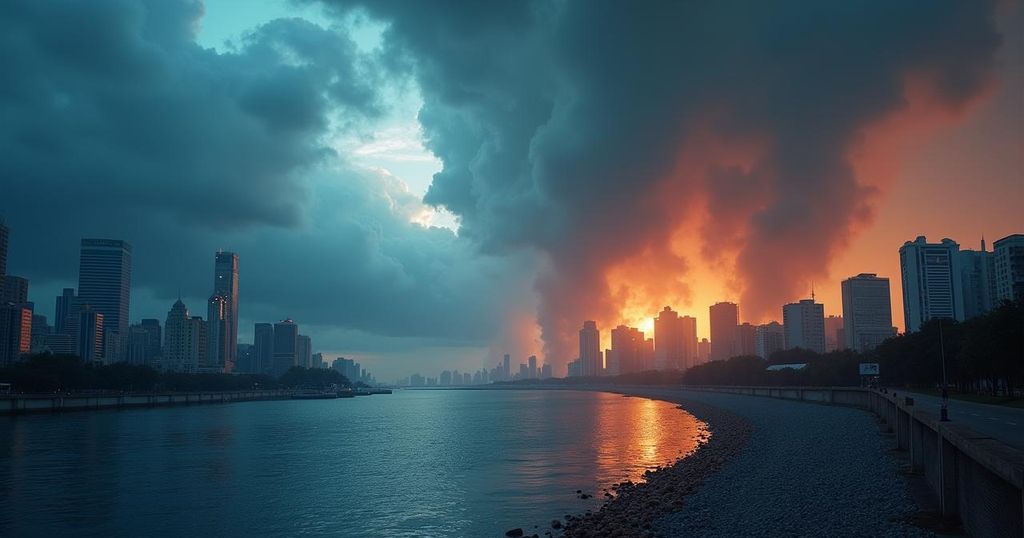Climate Change Intensifies Hurricane Impacts: Insights from Helene and Milton
Human-caused climate change has intensified the rainfall and wind of Hurricane Helene, impacting its severity and likelihood of similar future storms, such as Hurricane Milton, which threatens the Florida coast. Ongoing fossil fuel combustion is linked to increases in hurricane intensity, leading to significant risks of flooding and destruction. Experts emphasize urgent action to mitigate these effects and improve resilience planning against climate-related disasters.
Recent research indicates that human-induced climate change has intensified the rainfall and wind associated with Hurricane Helene by approximately 10% and 11%, respectively. This conclusion was drawn by scientists following an expedited study released shortly before the formation of a strengthening Hurricane Milton, which poses a threat to the Florida coastline. The analysis revealed that the warming climate increased Helene’s wind speeds by about 13 miles per hour, significantly influenced by unusually high ocean temperatures in the Gulf of Mexico, which were reported to be 3.6 degrees Fahrenheit above the historical average. Ben Clarke, a climate researcher from Imperial College London and a co-author of the study, noted that “Hurricane Helene and the storms that were happening in the region anyway have all been amplified by the fact that the air is warmer and can hold more moisture.” Consequently, the rainfall totals during Helene were extraordinarily high, exacerbated by the ongoing impacts of climate change. Experts suggest that Hurricane Milton may experience similar intensification effects due to elevated sea temperatures, which have made such conditions far more probable. The scientists emphasize that the ongoing combustion of fossil fuels will likely contribute to the occurrence of more hurricanes akin to Helene, leading to devastating flooding that extends away from coastal areas. Notably, many fatalities during Helene were attributed not to wind but rather to severe inland flooding. Upon making landfall in Florida, Hurricane Helene unleashed a record storm surge of 15 feet and sustained winds reaching 140 miles per hour. The storm caused catastrophic damage across several states, leaving millions without essential services and resulting in over 230 casualties—making it the deadliest hurricane on the U.S. mainland since Hurricane Katrina in 2005. Meteorologists estimate that Helene inundated the region with more than 40 trillion gallons of rain, a volume that would have been significantly reduced if not for human-induced climate change. “When you start talking about the volumes involved, when you add even just a few percent on top of that, it makes it even much more destructive,” explained Clarke. The frequency of hurricanes with intensity comparable to Helene, which was once expected to occur once every 130 years, is now estimated to be 2.5 times more likely due to climate change influences. The World Weather Attribution (WWA) initiative, established in 2015, aims to determine the extent to which extreme weather events can be linked to climate change. The rapid studies conducted by the WWA utilize peer-reviewed methodologies, comparing actual events with expected conditions in a world that has not experienced an average temperature rise of approximately 1.3 degrees Celsius since pre-industrial times. Additional analysis conducted by Lawrence Berkeley National Laboratory indicated that climate change was responsible for up to 50% more rainfall in certain areas impacted by Helene. Kim Cobb, director of the Institute at Brown for Environment and Society, emphasized the importance of recognizing these trends: “Helene and Milton should serve as a wake up call for emergency preparedness, resilience planning and the increased use of fossil fuels.” She warned that continued warming will exacerbate the statistics surrounding hurricanes, urging immediate action to mitigate potential future impacts. As scientists continue to investigate the implications of climate change on weather patterns, it is crucial to acknowledge the role human activity has in shaping these increasingly severe weather events. The trajectory of future hurricanes hinges on our collective actions regarding energy consumption and fossil fuel usage, reinforcing the need for urgent change in our energy systems to mitigate further risks and costs associated with climate change.
The current article addresses the recent findings on the impact of human-induced climate change on hurricanes, specifically highlighting Hurricane Helene and its potential implications for Hurricane Milton. Scientific studies demonstrate that climate change has significantly increased both rainfall and wind speeds in these storms, leading to widespread devastation and loss of life. The article underscores the importance of understanding these patterns in the context of emergency preparedness and resilience planning against future climate-related disasters.
In summary, the research underscores the alarming influence of climate change on the intensity and frequency of hurricanes, evidenced by the increased severity of Hurricane Helene and the potential threat posed by Hurricane Milton. The findings advocate for enhanced emergency preparedness strategies and highlight the necessity of reducing fossil fuel consumption to mitigate future climate impacts assuredly. Immediate action will be essential to protect communities from the devastating effects of increasingly powerful storms.
Original Source: www.mychamplainvalley.com




Post Comment